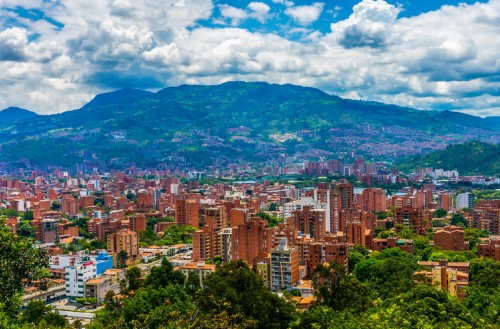Bad news sells. And for news editors looking for horror stories to recycle, Colombia’s second largest city used to be a reliable source.
But Medellín, which in 1991 was home to the highest murder rate in the world, has transformed itself. Its homicide rates are now comparable to those of US cities, and for some years headlines have been proclaiming its alliterative ‘miracle’. In 2013 Medellín won the Urban Land Institute’s ‘Innovative City of the Year’ award. And it’s been chosen to host UN-HABITAT’s 2014 World Urban Forum on the theme of Urban Equity in Development, for which 10,000 people have already registered.
The stories behind the headlines are fascinating. How did Medellín descend into such extreme violence? And how did it then reduce its murder rate by 90% and set what UN-HABITAT has called ‘a new global standard for urban policy‘?
Kate Maclean has been researching the transformation of this remarkable city for the Developmental Leadership Program. As her new paper explains, these stories are about power, politics, and coalitions of political actors galvanised by crisis.
Shortly after Medellín was named the most violent city on earth, its political actors – ranging from politicians to community leaders, from academics to business leaders – came together to look for ‘Future Alternatives for Medellín’.
Through a series of seminars, they sought to understand why drug lords like Pablo Escobar had been able to establish themselves so firmly in the politics of the city. Why had it been possible for paramilitary forces and urban militia to eclipse the formal authorities of state? Crucially, they asked whether Escobar was personally responsible – as was often implied in the simplistic headlines – for the city’s plight.
Escobar did order hundreds of assassinations and bombings as he battled his way to becoming one of the wealthiest people in the world. But the seminars concluded that a combination of factors had allowed many violent actors to become powerful in Medellín: inequality and exclusion, and the wider political and financial instability caused by Colombia’s continuing civil war and the recession of the 1980s. The Cartel, the military, paramilitaries and militias competed forcefully for the right to provide ‘security’, and violence became the ‘common sense’ way of getting things done.
So how to tackle these deeply-rooted dynamics of violence and exclusion? The discussions generated solutions that radically changed Medellín’s image.
Bold, strategically placed infrastructure projects aimed to reduce inequality and promote inclusion. Internationally acclaimed architects were commissioned to design for the most stigmatised areas of the city. Schools, public libraries and parks were created, and transport networks were extended, slashing commuting times from poor neighbourhoods to the city centre.
But behind the iconic buildings that have re-branded the city there’s been a long-term commitment to political as well as social and economic inclusion.
Checks and balances are designed to reduce the potential for populism. Innovative strategies encourage the creation of cooperatives and alliances between businesses and communities. In this astonishingly diverse city, platforms have been created where all perspectives can be expressed, including those of radical and minority groups.
The political process underlying these innovative policies was complex, not least because it involved persuading radical community organisations and the city’s traditional elites to sit together at the negotiating table.
So what made this possible? The research findings highlight a confluence of international, national and local influences that created an enabling political climate.
At international level, these influences included global capital, international development organisations, and the USA’s war on drugs. At national level, there was a commitment to addressing the violence in Medellín. And locally there was hunger for change.
Kate Maclean’s paper unpacks this transformative political process for anyone who wants to learn more about how political spaces can open up in the wake of a crisis of violence. And how political actors can use those spaces to create ‘miraculous’ change. Medellín illustrates not just innovation and inclusive urban planning, but how important it is to understand the role of elites and coalitions in development.









